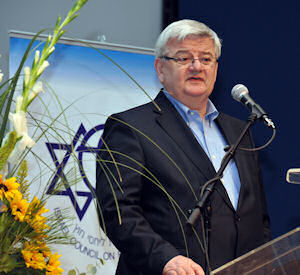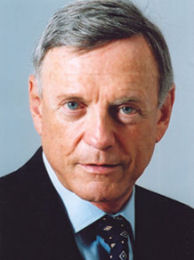Former German FM Joschka Fischer committed to a secure and safe Israel
06 Mar 2011The World Jewish Congress-sponsored Israel Council on Foreign Relations, the Interdisciplinary Center Herzliya and the Heinrich Böll Foundation co-hosted Germany's Former Foreign Minister Joschka Fischer at the Tel Aviv Museum. The following article on the event was published by the 'Jerusalem Post' on 6 March 2011. All photos by Andres Lacko.
 He will never vote for Angela Merkel, but he can vouch that the German chancellor is a staunch friend of Israel’s, former German Foreign Minister Joschka Fischer said in Tel Aviv on Thursday. Fischer was speaking at a symposium on the role of the German Foreign Ministry during the Nazi era. The event at the Tel Aviv Museum was cohosted by the WJC's Israel Council on Foreign Relations, the Interdisciplinary Center, Herzliya, and the Heinrich Böll Foundation. During his tenure as foreign minister (1998 to 2005), he appointed a commission of German, American and Israeli historians to research the Foreign Ministry’s complicity with the Nazi regime. The findings were recently released in a 900-page report that has been the subject of considerable private anguish, public debate and media attention in Germany.
He will never vote for Angela Merkel, but he can vouch that the German chancellor is a staunch friend of Israel’s, former German Foreign Minister Joschka Fischer said in Tel Aviv on Thursday. Fischer was speaking at a symposium on the role of the German Foreign Ministry during the Nazi era. The event at the Tel Aviv Museum was cohosted by the WJC's Israel Council on Foreign Relations, the Interdisciplinary Center, Herzliya, and the Heinrich Böll Foundation. During his tenure as foreign minister (1998 to 2005), he appointed a commission of German, American and Israeli historians to research the Foreign Ministry’s complicity with the Nazi regime. The findings were recently released in a 900-page report that has been the subject of considerable private anguish, public debate and media attention in Germany.
While Fischer has been praised in many quarters and criticized in others for initiating such an investigation, he declined to take the credit and said that it belonged to a 92- year-old woman by the name of Marga Hensler, who lives in Bonn. Hensler worked a translator during the Third Reich, and knew a great deal about former Nazis. Fischer confessed that he hadn’t really thought about doing anything to expose the involvement of the Foreign Ministry in the Third Reich’s atrocities.
It was fairly common knowledge in Germany after the Nuremberg trials and after the Eichmann trial, which had been televised and closely watched by German viewers, he said. Moreover, there had been other cases and many books and newspaper articles, and Fischer had been under the impression that Germany had made tremendous progress in confronting its past. When he entered the ministry in 1998, he thought it was all done, and that Germany had reached consensus. As far as he was concerned, there was no need for further historical examination. “It was a mistake, a miscalculation,” he admitted.
 What contributed to a major change in his attitude was the publication in a Foreign Ministry magazine of an obituary for Franz Nusslein, a very senior German diplomat, who during World War II was the prosecutor in occupied Prague, where he signed thousands of death warrants against people who allegedly belonged to the resistance. He was also a protégé of Reinhard Heydrich. But the details of his shameful Nazi past had been omitted from his glowing obituary. Hensler, who knew about Nusslein, wrote a letter of protest to Fischer, but it did not reach him. It had been dealt with through the usual bureaucratic channels, and Hensler, incensed at the pro-forma reply she received from the Foreign Ministry, wrote another letter of protest to then-chancellor Gerhard Schroeder, complaining about Fischer who, as a representative of the Green Party – which stood for, among other things, social justice, nonviolence and democracy – had disappointed her.
What contributed to a major change in his attitude was the publication in a Foreign Ministry magazine of an obituary for Franz Nusslein, a very senior German diplomat, who during World War II was the prosecutor in occupied Prague, where he signed thousands of death warrants against people who allegedly belonged to the resistance. He was also a protégé of Reinhard Heydrich. But the details of his shameful Nazi past had been omitted from his glowing obituary. Hensler, who knew about Nusslein, wrote a letter of protest to Fischer, but it did not reach him. It had been dealt with through the usual bureaucratic channels, and Hensler, incensed at the pro-forma reply she received from the Foreign Ministry, wrote another letter of protest to then-chancellor Gerhard Schroeder, complaining about Fischer who, as a representative of the Green Party – which stood for, among other things, social justice, nonviolence and democracy – had disappointed her.
Schroeder brought the complaint to Fischer’s attention. It turned out that Nusslein was on the United States war criminals list and had been convicted to serve 25 years in prison, but was released without pardon in the mid-1950s, at which time he joined the Foreign Service. After learning about Nusslein, Fischer decided that there would be no more Foreign Ministry obituaries for former members of the Nazi Party.
After he made that change, another very senior diplomat died, and when someone called to ask about the lack of an obituary and was told the reason, a large advertisement of solidarity with the deceased, signed by many former diplomats, appeared in the Frankfurter Allgemeine Zeitung. The deceased was not only a former Nazi, but a member of the SS. The memorial advertisement shook Fischer to the core and prompted him, in 2004, to appoint the independent commission of historians. He wanted to know what had happened from 1933 onwards, and was obsessive about exposing the truth. “I was naïve. I made a mistake and I had to correct it,” he said with hindsight, adding: “If you want to praise anyone – praise Marga Hensler.”
The younger generation of Germans was shocked by the report, said Fischer, because it revealed beyond doubt that “the Foreign Office was an integral part of the murderous machine of the Holocaust. The closeness of the Foreign Ministry to the highest SS ranks was a well-hidden secret.” Fischer cited as an example of the ministry’s involvement with the SS, the head of the Jewish desk who, when he had to declare the reason for his expenses, stated “killing Jews.”
This was not only a collaboration; it was part of the murderous machine,” said Fischer. The story also continued after the war. Fischer described the post-war history of the Foreign Service as “very depressing." The reason: “The Foreign Service successfully rearranged the facts: Hitler was bad. The SS was bad. War criminals were bad, but the others tried to stay clean.”
Fischer was not convinced.
 This was the first step of the new narrative. When the Foreign Service started again in the 1950s, there was a need for new biographies and control of these biographies. There were more former Nazis in the Foreign Service than during the Nazi period. Suddenly it became very important to have been part of the internal German resistance. “If so many Germans had resisted Hitler, democracy might have had a better chance; but this was part of the rearrangement of biographies,” he said Confronting the past is part of the battle of the German people after WWII, said Fischer. “You couldn’t deny the facts of Auschwitz and the moral responsibility of the German people.” But all that, he insisted, is part of yesteryear. “Democratic Germany nowadays is firmly based on the rule of law.” Fischer proclaimed his country to be “a strong democracy with a strong civil society.”
This was the first step of the new narrative. When the Foreign Service started again in the 1950s, there was a need for new biographies and control of these biographies. There were more former Nazis in the Foreign Service than during the Nazi period. Suddenly it became very important to have been part of the internal German resistance. “If so many Germans had resisted Hitler, democracy might have had a better chance; but this was part of the rearrangement of biographies,” he said Confronting the past is part of the battle of the German people after WWII, said Fischer. “You couldn’t deny the facts of Auschwitz and the moral responsibility of the German people.” But all that, he insisted, is part of yesteryear. “Democratic Germany nowadays is firmly based on the rule of law.” Fischer proclaimed his country to be “a strong democracy with a strong civil society.”
Facing the truth does not in his perception weaken a nation, but strengthens it. Asked whether Germany’s friendship toward Israel would endure, Fischer was adamantly affirmative. “There is no doubt that Germany will be Israel’s best friend in Europe,” he said, declaring Germany’s commitment to its security to be “bipartisan and serious.”
“Our relationship is based on our commitment to our historical, political and moral responsibilities,” he said.
By Greer Fay Cashman